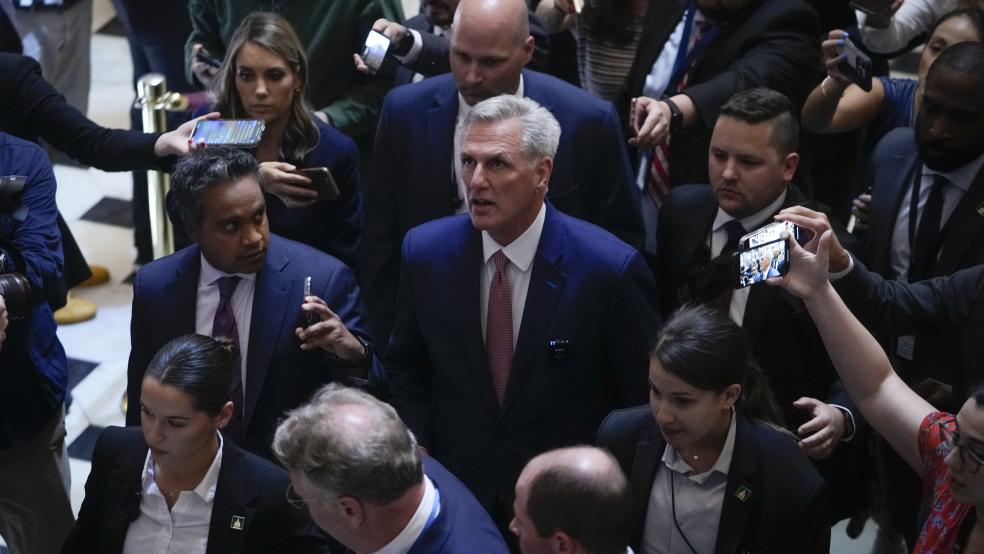The debt limit deal struck by President Joe Biden and Speaker Kevin McCarthy appears set to survive its first legislative test on Tuesday evening, clearing a procedural hurdle despite a growing revolt by Republicans.
The Rules Committee, comprised of nine Republicans and four Democrats, is poised to advance the 99-page bill to the full House, where it is expected to be brought to a vote Wednesday.
Two ultraconservative Republicans, Reps. Ralph Norman of South Carolina and Chip Roy of Texas, have announced their opposition to the bill, but Rep. Thomas Massie of Kentucky, another member of the far-right Freedom Caucus, indicated Tuesday that he will vote for it. Massie said that, while he opposed some parts of the deal, he would support the overall package, in particular because it includes a mechanism he helped write that is meant to push Congress to complete all 12 annual appropriations bills by automatically cutting spending by 1% if those bills are not passed on time.
Massie’s announcement means Republicans will likely have the seven votes they need to approve the bill without help from Democrats.
Treasury Secretary Janet Yellen told lawmakers last week that the deadline for raising the nation’s debt limit and avoiding an economically perilous default is June 5, meaning that time is running short for Congress to act.
“This bipartisan bill is not perfect. In fact, I’ve yet to meet one person who loves it,” Rep. Brendan Boyle of Pennsylvania, the top Democrat on the House Budget Committee, said. “Perhaps that is a sign that it is a fair compromise between a narrowly Republican House and a narrowly Democratic Senate — and, of course, a Democratic White House.”
McCarthy faces a drumbeat of dissatisfaction from Republicans that is growing ever louder. Some on the Republican right are incensed over the deal and insist that McCarthy should have demanded far more from Biden. The spending cuts in the bill are not as deep as Republicans had wanted and well shy of the trillions of dollars they had slashed in their Limit, Save, Grow Act.
The Washington Post reports that roughly 30 Republicans had pledged to vote against the bill by late Tuesday.
Earlier in the day, members of the House Freedom Caucus lambasted the legislation at a news conference. “Not one Republican should vote for this deal. It is a bad deal,” Roy said. “No one sent us here to borrow an additional $4 trillion to get absolutely nothing in return, but at best — if I’m being really generous — a spending freeze for a couple of years.”
Roy had previously labeled the bill a “turd-sandwich.”
Republican Rep. Dan Bishop of North Carolina told reporters he is considering a motion to oust McCarthy from his job as speaker. The “motion to vacate has to be done,” he said.
And Rep. Matt Gaetz said much would depend on how this week’s votes go. “If a majority of Republicans are against a piece of legislation and you use Democrats to pass it, that would immediately be a black-letter violation of the deal we had with McCarthy,” Gaetz told Newsmax, according to Politico. “And it would likely trigger an immediate motion to vacate.”
The Republican opposition to the deal also extends beyond the Freedom Caucus. Republicans including Reps. Kat Cammack of Florida, Wesley Hunt of Texas and Nancy Mace of South Carolina have all come out against the bill, signaling a breadth of opposition within the GOP — and the possibility that McCarthy may not be able to deliver the roughly 150 votes he reportedly had promised Democrats.
“The backlash to the plan from the right appeared to be fueled in part by mounting public opposition from conservative advocacy groups with strong ties to Republican lawmakers, including the Heritage Foundation, the Club for Growth and FreedomWorks,” The New York Times reported. “The groups were promising to include the vote in their ratings of lawmakers, effectively threatening to downgrade any lawmaker who supported it.”
McCarthy on Tuesday called the bill “the most conservative deal we ever had.” He and his allies have been making the case to Republican members and in the media that Democrats did not get a single thing they wanted in the deal. “That is kind of the amazing part. There were no wins for Democrats,” Republican Rep. Dusty Johnson of South Dakota told CNN on Sunday. “There is nothing after the passage of this bill that will be more liberal or more progressive than it is today. It’s a remarkable conservative accomplishment.”
What’s next: If the bill is passed by the House on Wednesday evening, it will then head to the Senate, where a number of Republicans have already voiced opposition and could slow its passage. A final vote could be delayed until the weekend.





